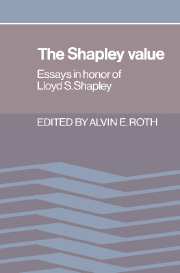Book contents
- Frontmatter
- Contents
- Preface
- 1 Introduction to the Shapley value
- I Ancestral papers
- II Reformulations and generalizations
- III Coalitions
- IV Large games
- 13 Values of large finite games
- 14 Payoffs in nonatomic economies: an axiomatic approach
- 15 Values of smooth nonatomic games: the method of multilinear approximation
- 16 Nondifferentiable TU markets: the value
- V Cost allocation and fair division
- VI NTU games
15 - Values of smooth nonatomic games: the method of multilinear approximation
Published online by Cambridge University Press: 13 October 2009
- Frontmatter
- Contents
- Preface
- 1 Introduction to the Shapley value
- I Ancestral papers
- II Reformulations and generalizations
- III Coalitions
- IV Large games
- 13 Values of large finite games
- 14 Payoffs in nonatomic economies: an axiomatic approach
- 15 Values of smooth nonatomic games: the method of multilinear approximation
- 16 Nondifferentiable TU markets: the value
- V Cost allocation and fair division
- VI NTU games
Summary
Introduction
In their book Values of Non-Atomic Games, Aumann and Shapley [1] define the value for spaces of nonatomic games as a map from the space of games into bounded finitely additive games that satisfies a list of plausible axioms: linearity, symmetry, positivity, and efficiency. One of the themes of the theory of values is to demonstrate that on given spaces of games this list of plausible axioms determines the value uniquely. One of the spaces of games that have been extensively studied is pNA, which is the closure of the linear space generated by the polynomials of nonatomic measures. Theorem B of [1] asserts that a unique value Ø exists on pNA and that ||Ø|| = 1. This chapter introduces a canonical way to approximate games in pNA by games in pNA that are “identified” with finite games. These are the multilinear nonatomic games—that is, games v of the form v = F° (μ1,μ2, …, μn), where F is a multilinear function and μ1, μ2, …, μn are mutually singular nonatomic measures.
The approximation theorem yields short proofs to classic results, such as the uniqueness of the Aumann—Shapley value on pNA and the existence of the asymptotic value on pNA (see [1, Theorem F]), as well as short proofs for some newer results such as the uniqueness of the μ value on pNA(μ) (see [4]).
- Type
- Chapter
- Information
- The Shapley ValueEssays in Honor of Lloyd S. Shapley, pp. 217 - 234Publisher: Cambridge University PressPrint publication year: 1988
- 6
- Cited by



